Yacht Clubs
The First Yacht Club
The
Alexandra
Yacht
club
came
perilously
close
to
extinction
in
its
early
days,
but
it
was
never
closer
to
being
a
write
off
than
in
1972.
Right
in
the
midst
of
preparations
for
the
centenary
festivities,
the
club
almost
went
up
in
smoke
in
November
when
a
fire
destroyed
the
main
bar
and
most
of
the
roof,
and
many
valuable trophies were close to the melting pot.
The
club
was
formed
on
15th
January
1873,
and
it
started
not
as
a
yacht
club
but
as
the
Alexandra
Club
based
in
Alexandra
Street.
Its
rules
included:
“No
unlimited
loo
(a
round
card
game
with
penalties
to
the
pool),
hazard
(a
game
with
two
dice),
or
other
games
of
chance
shall
be
played;
no
dice
shall
be
used
in
the
club
except
for
the
purpose
of
playing
back
gammon
and
no
smoking
shall
be
allowed
except
in
a
room
set
apart
for
this
purpose.”
This
was
one
of
the
rules
retained
when
the
name
was
changed
to
the
Alexandra
Yacht
Club
four years later.
The
inaugural
meeting
was
held
at
the
house
of
a
Mr
Barron
and
Mr
G.
W.
Lay
presided.
A
fortnight
after
the
the
club
was
founded,
a
meeting
room
was
secured
at
the
back
of
the
old
Public
Hall
which
later
became
the
Empire
Theatre
in
Alexandra
Street
and
later
still
the
ABC
Cinema.
The
annual
subscription
for
ordinary
members
was
fixed
at
one
guinea,
and
after
March
1st
an
entrance
fee
of
10s
6d
was
imposed.
The
first
balance
sheet
on
24th
July
1873,
reported
subscriptions
of
£59
1s
7d,
one
of
10s
6d
and
four
of
5s.
The
rent was £16 15s and the cost of periodicals, papers etc. was “20 11s. There was a credit balance of £20 0s 4d.
At
the
annual
meeting
in
January
1874,
the
club’s
existence
was
threatened
by
financial
difficulties
and
a
special
committee
was
appointed
to
consider
whether
there
was
sufficient
support
to
carry
on.
When
this
committee
met
on
2nd
February
1874,
it
was
agreed
that
certain
members
should
pledge
themselves
to
bear,
in
equal
shares,
any
deficiency
in
the
club’s
finances
which
might
appear at the end of the year. Subsequent events proved that the generosity of these members was the salvation of the club.
On
12th
October
1874,
one
of
the
members,
a
Mr
Hatch,
considered
the
club
was
in
the
wrong
place
and
suggested
that
a
house
should
be
rented
where
a
room
could
be
set
aside
for
billiards,
and
beds
provided
for
members.
Drastic
changes
were
made
the
following
month
when
it
was
decided
that
all
holders
office
should
cease
to
act
at
the
end
of
the
year,
that
the
rules
be
revised,
and
new
officers
appointed.
It
was
also
agreed
that
a
billiards
table
be
purchased,
and
that
the
wages
of
the
marker
should
be
7s
6d
a
week.
In
order
to
carry
out
these
reforms,
it
was
agreed
to
raise
the
annual
subscription
to
two
guineas,
at
least
40
members
being
required
at
this
amount
to
make
it
economic.
Non
resident
members
were
to
be
charged
an
annual
sub
of
one
guinea.
Eight
members
put up the cash to purchase a half-size billiards table, and it paid for itself in 17 months; the members getting their money back.
It
was
in
January
1877
that
the
question
of
a
new
clubhouse
was
raised,
and
although
it
was
suggested
that
£1000
be
raised
in
shares,
the
committee,
a
month
later,
did
not
consider
it
advisable
to
make
a
change
at
this
time.
But
at
the
same
meeting,
it
was
agreed,
on
the
proposition
of
Mr
W.
G
Brighten,
that
the
name
be
changed
to
Alexandra
Yacht
Club
and
that
membership
be
increased.
There
was
some
opposition
but
the
name
was
changed
on
the
1st
March,
the
subscriptions
however,
remained
the
same.
The
club
played
a
big part in the Round Great Britain yacht race which started off Southend in 1877.
A
big
day
in
the
life
of
the
Alexandra
Yacht
Club
came
on
6th
September
1883,
when
it
was
agreed
to
purchase
a
house
and
land
on
the
cliffs,
property
occupied
by
by
Mr
Jack
Chignell
for
£850.
A
company
was
formed
with
the
object
of
erecting
and
equipping
a
new
clubhouse
for
£3000,
the
money
to
be
raised
in
£1
shares.
An
amendment
to
secure
cheaper
premises
was
lost
and
the
club
still
remained
operating
on
the
same
site.
The
Alexandra
Yacht
Club
had
always
offered
hospitality
to
national
and
international
sailors
and
often
acted
as
hosts
to
Royal
Navy
ships
anchored
off
the
Pier.
The
club
has
also
been
visited
by
a
reigning
monarch
in
the
Royal
Yacht.
On
the
evening
of
the
23rd
August
2014,
the
now
derelict
Alexandra
Yacht
Clubhouse
suffered
a
devastating
fire,
the
club
had
previously
moved
elsewhere,
following
a
report
on
the
100+
year
old
building
which
brought
to
light
structural
issues.
Its
construction
was
mainly
made
from
wood
with
brick
chimneys,
what
little
was
left
of
the
building
was
later
demolished
and
the
site
cleared.
Other Yacht Clubs
There
have
been
many
other
yacht
clubs
formed
since
in
the
Southend
area.
One
of
the
earliest
was
was
the
Essex
Yacht
Club,
formed
in
1890
when
functioning
from
a
small
bungalow
at
the
foot
of
Leigh
Cliffs.
Members
later
moved
their
headquarters
to
the
floating
Gypsy,
and
when
this
craft
became
unserviceable
the
club
obtained
Carlotta,
the
former
Tilbury
ferry,
in
1930,
and
renamed
her
Gypsy.
With
the
outbreak
of
World
War
Two,
the
headquarters
ship
was
requisitioned
by
the
Government
and
stationed
near
Tower
Pier
in
London.
It
was
sunk
during
an
air
raid.
This
left
the
club
homeless
and,
for
a
time,
members
used
the
old
Leigh
Station
buildings
before
purchasing
the
Lady
Saville
in
1947.
This
was
a
Dover
harbour
tender
of
substantial
proportions
and
was their headquarters moored at the foot of Leigh Cliffs.
Leigh
Sailing
Club
founded
in
1911,
now
installed
in
the
old
station
at
Leigh,
first
had
its
headquarters
the
ship
Veronica
moored
just
east
of
Bell
Wharf.
Just
before
World
War
Two,
she
was
replaced
by
a
larger
craft,
the
trading
ship
Lady
Quirk
which
was
moored
on
the
same
site.
When
barbed
wire
fences
during
the
war
made
her
inaccessible
to
members,
the
Lady
Quirk
became
useless
as
a
club
centre
and
later
was
broken
up.
They
had
temporary
use
of
the
Crooked Billet in Leigh Old Town.
In
1935,
Leigh
welcomed
membership
of
a
rather
unique
yachting
club
formed
by
the
boys
of
Westcliff
High
School,
sailing
dinghies
and
other
small
craft.
This
section
was
known
as
the
Crowstone
Sailing
Club,
but
failing
to
survive
the
war, was absorbed by the Leigh Club.
Thames
Estuary
Yacht
Club,
with
its
fine
headquarters
in
The
Leas
at
Westcliff,
is
more
of
an
amalgamation
than
the
original.
German
action
during
the
war
destroyed
the
headquarters
of
the
Nore
Yacht
Club
which
had
previously
been
known
as
the
Minima
Yacht
Club.
It
was
renamed
the
the
Nore
in
1902
when
Alderman
J.
C.
Ingram
was
its
commodore.
The
club
continued
with
its
headquarters
at
the
foot
of
the
Cliffs
until
World
War
Two
caused
the
entire
seafront
to
be
sealed
off
by
the
naval
and
military
authorities.
It
was
used
as
a
Service
centre
until,
by
an
unhappy
fluke,
it
was
completely
demolished
by
a
German
bomb
in
1940.
The
bomb
killed
10
servicemen,
one
of
whom
was
to
have
been
married the following day.
Some
of
the
old-time
sailing
fraternity
declare
that
the
Minima
(later
the
Nore)
was
really
a
continuance
of
what
used
to
be
the
Westcliff
Yacht
Club.
This
club,
they
say,
came
into
being
around
the
1900s
and
had
its
first
headquarters
on
an
all
metal
boat
moored
of
the
Westcliff
front
near
Shorefields.
This
was
bombed
out
of
existence
and
another
boat
was
brought
over
from
Holland.
They
also
say
the
club
went
out
of
existence
altogether
between
the
wars.
And
from
that
conglomeration
of
information,
they
say
the
Westcliff, Minima and Nore are now known as the Thames Estuary Yacht Club.
Other yachting facilities include the Wakering Yacht Club, Thorpe Bay Yacht Club, The Halfway Yacht Club.

Postcard The Gypsy Leigh-on-Sea
Postcard Alexandra Yacht Club
Southend-on-Sea
Postcard of the Nore Yacht Club
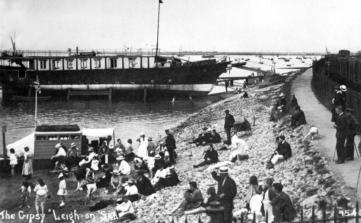
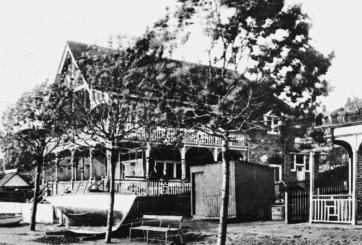
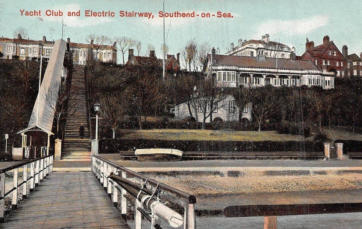
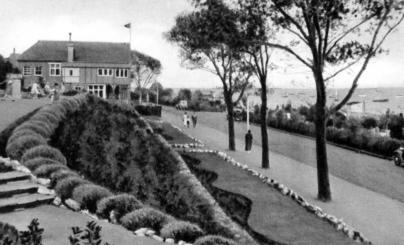
2020 Leigh-on-Sea Sailing Club
Minima Yacht Club
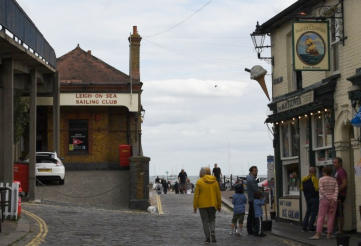
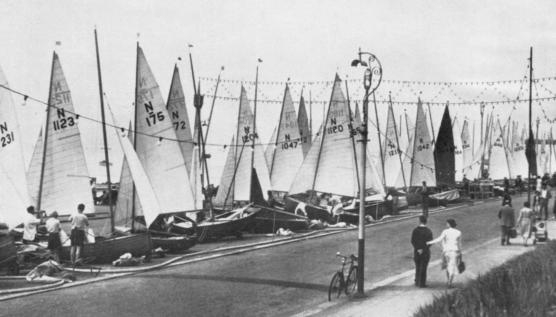
1955 Sailing Week, Seafront, Westcliff
Southend Timeline Southend-on-Sea © 2009 - 2024. All Rights Reserved



SOUTHEND CITY

Southend-on-Sea’s No 1 History Website! Documenting The Town & The Townspeople
Now Incorporating The Sea Of Change Website
Website Info:


Chalkwell ▪ Eastwood ▪ Leigh-on-Sea ▪ Prittlewell ▪ Shoeburyness ▪ Southchurch ▪ Thorpe Bay ▪ Westcliff-on-Sea
































































